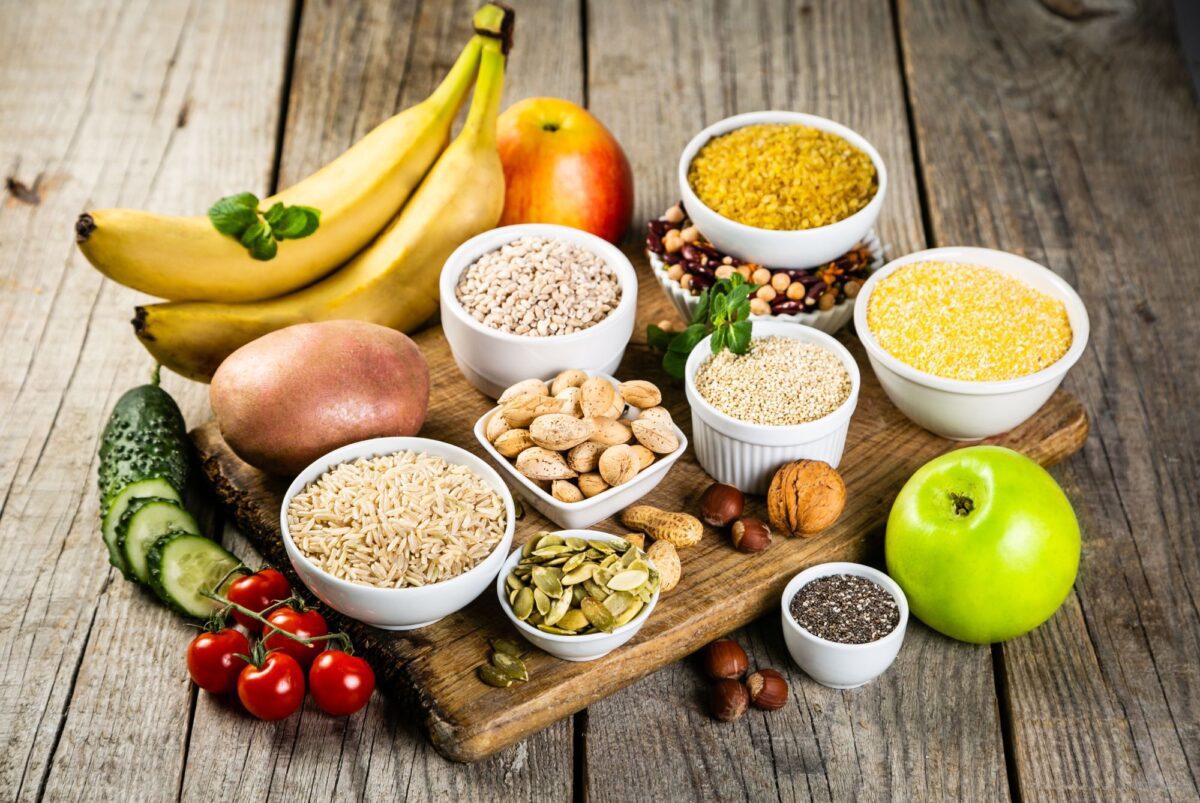Are Carbs Bad for you? What a dietitian wants you to know

Are Carbs Bad for you? What a dietitian wants you to know
With “health and wellness” being all the rage on social media, and fitness influencers taking over your algorithms, it’s no wonder you might be confused about carbohydrates and whether there are in fact good carbs and bad carbs. When you’re constantly seeing messages like, “Keto is the only way!” “Carnivore for ultimate health!” “Sugar-free is the key!” It’s easy to get caught up in the “carbs are bad” narrative. So, are carbs bad for you?
Our Accredited Practising Dietitian provides a dose of reality and evidence-based truth: Carbohydrates are not the enemy. They are a fundamental fuel source that your body needs to thrive, impacting everything from your energy levels to your mood. Let’s navigate past the social media hype and understand why carbs are an essential part of a healthy and balanced life.
What Are Carbs Anyway?
Think of carbohydrates (or “carbs”) as one of the main fuels your body uses for energy, like fuel for a car. The other two main fuels are protein and fat. These three are called “macronutrients” because your body needs them in larger amounts every day. Each one does its own important job to keep you healthy.
When you eat carbs, your body breaks them down into a simple sugar called glucose. This glucose travels through your blood and gives your cells the energy they need to do everything – from walking and talking to thinking and even breathing!
You might think “carbs” just means things like bread, pasta, and potatoes…but, lots of foods have carbs in them.
There are three main types of carbs:
- Sugar: These are naturally occurring in fruit, milk and also found in our table sugars, lollies, syrups and honey. Your body can break down sugar really quickly for a fast burst of energy.
- Starch: You’ll find starch in foods like bread, rice, wraps, potatoes, pasta, oats, and cereal. These take a little longer for your body to digest, giving you more lasting energy.
- Fibre: This is the roughage found in fruits, vegetables, whole grains, nuts, seeds, beans, and lentils. Your body can’t actually digest fibre for energy, but it’s super important for keeping your digestion healthy, making you feel full, and even helping your heart.
Why Your Body Loves Carbs (and Needs Them)
Carbs aren’t just empty calories – they do some seriously important jobs:
- Fuel for Your Body and Brain: Carbs are your body’s go-to energy source. It’s easier for your body to turn carbs into energy than protein or fat. Your brain loves glucose from carbs! It needs a steady supply to help you focus, make decisions, plan, and even manage your mood. Think of it like putting petrol in your car – you need to fill up regularly to keep it running!
- Keeping Muscles Strong: Carbs also play a protective role known as the “protein-sparing effect”. When you eat enough carbs, your body prioritises using them for energy instead of breaking down your muscle tissue. This ensures that the protein you eat goes towards building and repairing your muscles and supporting your immune system.
- Keeping Your Digestion Happy: Fibre, one of the three main types of carbs, is like a superhero for your gut! It helps good bacteria grow in your intestines, which is important for healthy digestion. Fibre also helps keep things moving smoothly in your digestive system, preventing constipation.
- Staying Hydrated and Boosting Your Immune System: Carbs help your muscles and organs hold onto water, which keeps you hydrated. This helps your muscles work longer and your organs function properly. Plus, getting enough carbs supports your immune system, helping you stay healthy.
- Boosting Your Mood and Helping You Sleep: Carbs help your brain to produce the neurotransmitter serotonin (the feel-good chemical). Serotonin regulates your mood, sleep cycle and appetite. Getting enough carbs can help prevent low mood and cravings, whilst promoting better sleep and helping you to feel satisfied after meals.
- Supports ALL Physical Activity: Even if you’re not an athlete, your body still relies on carbs for energy. Carbs are stored in your muscles as glycogen (a readily available energy source) for bursts of activity. They provide the most efficient fuel for your muscles from climbing stairs to smashing your local Park Run or CrossFit class.
How Many Carbs Do You Need? (It’s More Than You Think)
Carbs should actually make up the biggest part of what you eat each day. The general recommendation of 45-60% of your daily calories from carbohydrates is a good starting point for most healthy adults. However, it’s important to remember that everyone’s carbohydrate needs will be slightly different. Here are some of the main things that can affect how many carbs are right for you:
- Your Activity Level: If you’re very active and exercise regularly, your body will use more carbohydrates for energy. Someone who does intense workouts or long periods of physical activity will generally need more carbs to fuel their muscles and help them recover.
- Your Body Mass: Larger individuals generally have higher energy needs overall, which can translate to a need for more carbohydrates to support those energy demands.
- Specific Health Conditions: Certain health conditions, like diabetes, require careful management of blood sugar levels. For individuals with diabetes, the type and timing of carbohydrate intake are particularly important, and they often work closely with a dietitian or healthcare provider to determine their specific needs. Other conditions might also influence carbohydrate requirements.
To figure out what’s best for you, it’s always a great idea to consider talking to an Accredited Practising Dietitian. They can help you create an individualised eating plan that considers your activity level, body size, health status, and lifestyle.
“Good” vs “Bad” Carbs
Foods don’t have moral value and can’t be “good” or “bad” – Sorry fit-fluencers! All carbs play important roles in our diets and it’s essential to understand how they can fit into your overall needs and lifestyle.
Think of complex carbs (starch and fibre) as your nutrient powerhouses. Choosing these more often can contribute to sustained energy levels, support digestion, control blood sugars, promote feelings of fullness, and support long-term health.
On the other hand, simple carbohydrates (sugars) can provide a quicker source of energy. This can be particularly useful before, during or after intense physical activity when your body needs readily available fuel. However, it’s worth noting that whole fruits and dairy also come with valuable vitamins and minerals.
Beyond just fuelling our bodies, food plays a significant role in our enjoyment of life, social connections, and cultural experiences. There’s absolutely room for that slice of birthday cake, the occasional pastry with a friend, or your favourite comfort food. These choices aren’t nutritional failures; they’re part of a balanced relationship with food that acknowledges pleasure and connection.
Low GI Foods: Does Glycaemic Index Really Matter?
You might have heard about the “glycaemic index” or GI. It’s like a speed meter for how quickly a carb-containing food raises your blood sugar. High GI foods make your blood sugar go up faster than low GI foods.
Generally, sugary foods have a higher GI because they digest quickly. Starchy foods tend to have a lower GI because they take longer to break down and fibre usually lowers a food’s GI because it slows down digestion.
But here’s the thing: how often are you eating foods on their own? A slice of white bread might have a high GI on its own, but if you make it into a sandwich with meat, cheese, and veggies, the overall effect on your blood sugar will be different. Having a balanced plate, (with carbs, protein, veggies, and healthy fats), will slow down the breakdown of those sugars. So, while the GI is interesting, it’s not the whole story. It’s more important to think about eating a variety of foods together.
Common Carb Myths Debunked
Let’s clear up some of the confusion:
- Myth: Carbs make you gain weight. Reality: Eating too many calories from any food can lead to weight gain. Carbs themselves aren’t the culprit. In fact, many healthy, high-fibre carb foods can help you feel full and satisfied.
- Myth: Low-carb or no-carb diets are the best for weight loss. Reality: While cutting carbs might lead to some initial weight loss (mostly water weight), long-term weight loss depends on creating a calorie deficit, no matter where those calories come from. Plus, severely restricting carbs can have negative side effects.
- Myth: Eating carbs at night will make you fat. Reality: Your body uses calories for energy regardless of the time of day. What matters most is the total number of calories you eat throughout the day.
What Happens When You Don’t Eat Enough Carbs?
Cutting carbs too much can lead to some unpleasant side effects:
- Feeling constipated because you’re not getting enough fibre
- Bad breath (your body starts burning fat for energy, which releases ketones)
- Feeling tired and having low energy
- Mood swings and trouble concentrating
- Sleeping poorly
- A weaker immune system
- Prevents sustainable weight loss efforts
The Bottom Line: Embrace the Carbs!
If you want to be healthy and happy, you don’t need to fear carbohydrates. In fact, they should be a big part of your daily diet. So, enjoy those morning oats, savour your sweet potato, and don’t feel guilty about your favourite pasta dish. These foods are giving your body and brain the fuel they need to thrive!
For more information on nutritious and individually tailored diets – and advice about the relevance of carbohydrates specifically to you, consult with our qualified dietitian.
Book an appointment with our dietitian, or request a call by completing the following form. Alternatively call us directly on 07 3177 7779 to book.


